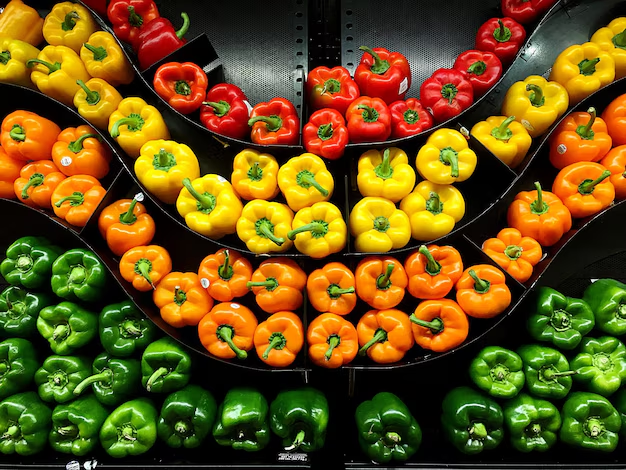Should You Keep Peppers In The Refrigerator? The Ultimate Guide to Storing Peppers
Are you a pepper enthusiast or simply someone who enjoys cooking with flavorful peppers? Whether you're using them for a vibrant salad, a spicy stir-fry, or even a decorative garnish, the question of how to store peppers for maximum freshness and longevity is key. Should they be stored in the refrigerator, or is it better to leave them out? Let’s delve into this hot topic by exploring several aspects of pepper storage.
🌶️ The Basics of Pepper Storage
Understanding Pepper Types
Peppers come in a variety of shapes, sizes, and heat levels. From the mild bell peppers to the fiery habaneros, each type has its own characteristics that can influence storage needs. The texture of peppers—thick or thin-walled, colorful or green—can affect how they should be stored to maintain freshness and taste.
Why Storage Matters
Proper storage extends the shelf life of peppers, reduces waste, and ensures that their nutritional benefits remain intact. Peppers are rich in vitamins A and C, fiber, and antioxidants, making their freshness paramount to preserving these health benefits.
🏡 Room Temperature vs. Refrigerator: The Great Debate
Room Temperature Storage
Storing peppers at room temperature can be suitable for short-term needs. This method can enhance the ripening process for some types, especially when they are slightly under-ripe. For best results:
- Place unwashed peppers in a well-ventilated basket or paper bag.
- Avoid plastic bags, as moisture buildup can lead to mold.
- Keep them in a cool, dry area away from direct sunlight.
Pros: Convenient, preserves flavor. Cons: Shortens shelf life, risk of overripening.
Refrigerator Storage
Refrigerators are a popular choice for extending the lifespan of peppers. When stored correctly, peppers can last longer in the fridge, maintaining their crunchiness and flavor.
- Use the crisper drawer: The controlled humidity helps preserve freshness.
- Wrap loosely in paper towels or breathable bags to prevent moisture buildup.
- Avoid washing before storage to reduce the risk of mold growth.
Pros: Extends freshness, retains nutrients. Cons: Potential chilling injuries if too cold, may alter texture slightly.
💡 Factors Influencing How You Should Store Peppers
Pepper Ripeness
Unripe Peppers: These can benefit from room temperature storage to complete the ripening process. Once ripe, they should move to the refrigerator.
Ripe Peppers: Store in the fridge to extend shelf life and maintain peak flavor.
Intended Use
- Immediate Use: For peppers that will be consumed within a few days, room temperature storage is sufficient.
- Long-term Use: Refrigerate if you plan to use peppers over a longer period.
Type of Pepper
- Thick-Walled Peppers (e.g., bell peppers): More resilient to refrigeration and maintain their texture well.
- Thin-Walled Peppers (e.g., jalapeños, habaneros): These can handle room temperature storage but are also fridge-friendly.
🧑🍳 Practical Tips for Storing Peppers: A Handy Guide
Here’s a summary of tips that can help you decide the best way to store your peppers:
- 🥶 Refrigerate thick-walled peppers to retain crunchiness.
- ⏳ Use thin-walled peppers quickly, regardless of storage method, to maintain their taste.
- 🌡️ Ripen unripe peppers at room temperature for a few days before moving them to the fridge.
- 💧 Keep peppers dry until they are ready to be used to avoid mold and spoilage.
- 📅 Check regularly for spoilage and use or discard any that show signs of decay.
📊 Visual Summary: Pepper Storage Cheat Sheet
| Factor | Room Temperature | Refrigerator |
|---|---|---|
| Unripe Peppers | Ideal for ripening | Move when ripe |
| Ripe Peppers | 1-3 days storage | 1-2 weeks storage |
| Thick-Walled | Short-term | Best choice for storing |
| Thin-Walled | Quick usage | Short-term, monitor for texture changes |
| Moisture Control | Keep dry | Store in breathable bags |
🌱 Additional Considerations
Organic vs. Conventional Peppers
Organic peppers may have a shorter shelf life due to the absence of preservatives. However, they can be stored similarly to conventional peppers, providing personal preference or dietary needs do not dictate otherwise.
Freezing as an Option
For those facing an overabundance of peppers, freezing is a viable alternative. While it can affect texture, frozen peppers are perfect for cooked dishes like soups and stews. To freeze peppers:
- Wash and dry thoroughly.
- Chop or slice according to your preference.
- Lay them flat on a baking sheet to pre-freeze, then transfer to airtight containers.
🍽️ Using Stored Peppers: Culinary Tips
Stored peppers can be used in a variety of delicious ways, adding color and spice to meals:
- Add to salads or wraps for a fresh, crunchy bite.
- Incorporate into stir-fries and pasta for a pop of color and flavor.
- Roast or grill for a smoky, caramelized taste.
- Use in salsas and dips to add a kick.
By understanding how to store peppers correctly, you ensure that each meal is enhanced with the premium taste and texture that only fresh peppers can provide.
The question of whether to refrigerate peppers depends largely on the type of pepper, its ripeness, and how quickly you plan to use it. By factoring in these considerations, you can make the most of your culinary endeavors, ensuring that every dish benefits from the vibrant flavor of perfectly stored peppers. 🌿

